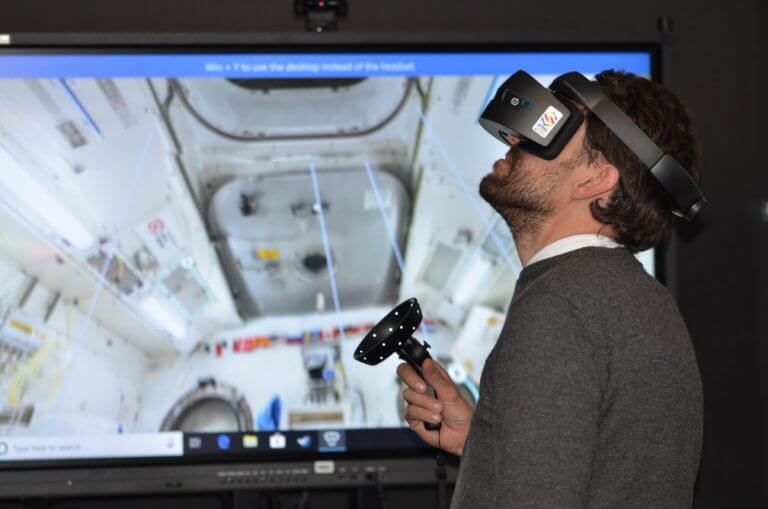
The UK government recently unveiled a new EdTech strategy in an attempt to address issues educators face with the boom of new technologies.
According to a press release from the Department for Education (DfE), “The use of technology in education will be transformed by a new Government strategy published today to reduce teacher workload, boost student outcomes and help level the playing field for those with special needs and disabilities.”
The strategy is backed by funding of £10 million to support innovation and raise the bar in schools, colleges and universities across England.
They outlined 10 education challenges the strategy aims to address and how they plan to do so.
Easing teachers’ heavy workloads

Teachers can use technology to make certain tasks easier. Source: Shutterstock
A recent study found that teachers in the UK are being overworked, working the most unpaid hours on average each week (12.1 hours), compared to other workers in the country.
Hopefully, technology can help. To reduce teacher’s marking workload, the strategy plans to address how technology can be used to cut down time teachers spend on this arduous daily task.
Other challenges include identifying how anti-cheating software can be improved and boosting training opportunities for teachers.
Education Secretary Damian Hinds said, “We are living in a digital world with technology transforming the way we live our lives – both at home and in the workplace. But we must never think about technology for its own sake. Technology is an enabler and an enhancer. For too long in education, technology has been seen as something that adds to a teacher’s workload rather than helps to ease.”
He said that this strategy is just the first step in making sure schools and universities are able to take advantage of educational technology opportunities.
“We now call on schools, businesses and technology developers to realise the huge potential of technology to transform our schools so that teachers have the time to focus on teaching, their own professional development, and – crucially – are able to cater to the needs of every single one of their pupils.”
Supporting teachers is a key focus of the strategy, as the government will also be launching a series of “‘demonstrator schools and colleges”, which will showcase the best practices of using EdTech, as well as providing “peer-to-peer support and training for teachers, lecturers and school leaders.”
This will go alongside free online training courses for teachers and school leaders, provided for free and produced by the Chartered College of Teaching, to equip them with the knowledge required to make the best use of technology.
Harnessing the power of technology in special education
This years #AutismAwarenessDay focuses on “Assistive Technologies, Active Participation”, which is everything that Special iApps encourage! Children should be provided tools that can adapt to their needs and abilities which is why all of our apps are designed to be accessible pic.twitter.com/eRj9xR4654
— Special iApps (@specialiapps) April 2, 2019
The vast potential of using technology to make learning possible for those with special needs is also a main focus of the strategy.
Recognising that technology has the power to improve learning outcomes for those who aren’t suited to a more traditional education, one of the challenges mentioned was “promoting the use of innovative technology to make education accessible and inclusive for those with special education needs and disabilities.”
According to the statement, “As part of the strategy, the Education Secretary will announce that leading assistive technology developers and education experts will make recommendations to the Government on ways to harness the power of technology to support learners with conditions such as dyslexia or autistic spectrum disorders to thrive in the classroom.”
Connecting schools to relevant businesses
The strategy will also bring together teachers and educators with innovative technology-based businesses to tackle common challenges, as well as to make sure those working in education are well-equipped with the necessary skills and tools to meet the needs of schools, colleges and their pupils.
The government will be working as partners with Nesta, the UK’s innovation foundation, “to find technological solutions on essay marking, formative assessment, parental engagement and timetabling technology – four of the ten EdTech challenges set out in the plan.”
The collaboration will support the development of products, so they meet the needs of everyone involved – teachers, lecturers and students alike.
They will also be working with BESA (British Education Suppliers Association), who will be helping schools make the right decisions when it comes to buying technology through LendED (a free service which enables schools to try educational software before they buy).
The statement reads, “This platform will help to ensure that schools and colleges are getting the best value from the hundreds of millions spent every year on digital technology, to ultimately improve student outcomes, reduce teacher workload and help schools save money.”
Minister for Universities, Science, Research and Innovation, Chris Skidmore, said, “As the way we interact with technology is changing at an ever-increasing rate, it is more important than ever that the education system keeps pace with the change around us. We need to work with leading head teachers, education experts and tech companies to unlock the benefits for our children and young people.”
It’s still early days in terms of this strategy and how it will be implemented, and it is hoped that UK educators will now be able to better overcome challenges in EdTech.







